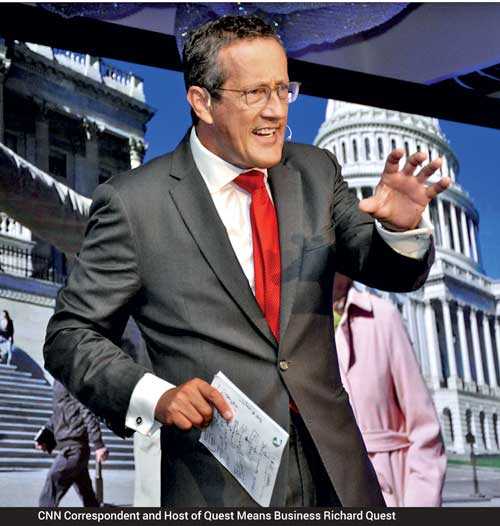Wednesday Feb 25, 2026
Wednesday Feb 25, 2026
Tuesday, 24 September 2019 12:10 - - {{hitsCtrl.values.hits}}
World-famous CNN correspondent Richard Quest yesterday in Colombo warned the travel industry of three challenges to its future, one of which was “overtourism.”
Speaking at the Cinnamon Future of Tourism Summit in Colombo, Quest listed the other two challenges as the issue of security with reference to the wider use of biometrics and climate change.
Although urging the industry to reflect on the beauty of tourism itself, Quest identified overtourism as the single biggest issue confronting the sector.
Having asked summit participants for a show of hands of who made a holiday in recent months and who did not, Quest who is CNN’s Business Editor at Large, said that indeed tourism and travel executives contribute to the industry.
“Tourism is indeed both sides of the same coin and the industry must address the issue of overtourism in the future. There is no solution that will easily lend itself to the problem of overtourism. How will destinations preserve the tourist experience,” Quest asked those from the travel and tourism industry assembled at the Cinnamon Summit, suggesting a focus on quantity destroyed an authentic experience.
Taking a Sri Lankan example, Quest, who arrived in Sri Lanka on Friday, said the Minneriya National Park was overcrowded, with jeeps and tourists outnumbering elephants.
“There was a herd of elephants and a horde of less spotted tourists in jeeps,” he quipped.
Quest noted that Sri Lanka tourism industry representatives were referring to a future target of five million tourists but asked summit participants, “How are you going to handle them? What you going to do with three or five million tourists? Where will you put them?”
“The last two weeks I have been to the Edinburgh Castle, Times Square, Piccadilly Circus and the Trevy Fountain in Rome, all of which were overcrowded with tourists. So overtourism is the single biggest problem that the industry will have to deal with,” reiterated Quest, who is CNN’s foremost international business correspondent.
Quest warned that with a rise in Chinese tourists, which every destination is clamouring for, comes a more daunting challenge.
Quest stressed the need to carefully plan and ensure tourism remained sustainable.
“Overtourism is something that the industry can control, unlike natural disasters,” he stressed but pointed out, “Overtourism is way more challenging than security or environment because how do you deny the right of people to travel when they want to, where they want to, see what they want to.”
He said climate change and environmental issues would impact the future of tourism as well and the industry needed to be prepared.
“This (environmental and climate change) is the sleeper burner issue” for the industry, suggested Quest.
He also said that industry personnel and tourists must walk the talk when it came to protecting the environment in their individual decisions during hotel stays such as changing linen and towels, etc.
“Going forward, hotels will make the choice for their five star guest and not vice versa when it comes to conserving the environment,” he added.
Quest noted that the airline industry too was fast realising its own responsibility to reduce its emissions.
Focusing on the issue of security and biometrics, he said Emirates was planning the first flight where passengers would board via biometrics rather than paper identification. The UK has introduced biometric passport readers instead of queuing up.
“So biometrics is the future of travel and tourism as it offers convenience and added security for the country,” he added.
With regard to the Easter Sunday tragedy, Quest’s message was, “Never waste a crisis,” which is a modified version of the famous adage ‘Never waste a good crisis’ or ‘Never let a good crisis go to waste’ from Winston Churchill. The Sri Lanka tourism industry must decide what to do about it and how to adapt.
-Pix by Lasantha Kumara